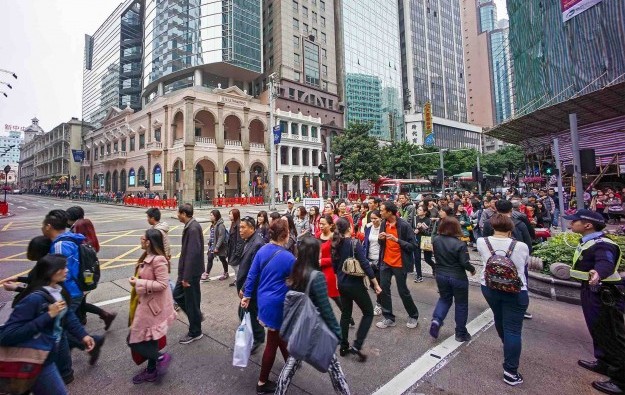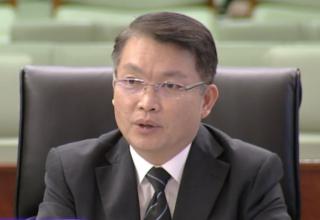Asian casinos no rival to Macau in Chinese mass: UBS
Dec 01, 2015 Newsdesk Latest News, Macau, Top of the deck

It is “too early” for casino operators in Macau to worry about regional competitors’ impact on the city’s base mass segment of players, says a new report from UBS Securities Asia Ltd.
The conclusion is based on a survey involving 510 mainland Chinese gamblers from Macau’s mass segment. The results indicated these players showed only “mediocre interest” in visiting casinos located in other parts of the Asia Pacific region, according to the UBS report, released on Monday.
“We think other Asian casinos will unlikely be able compete with Macau for [mainland Chinese] base mass gamblers until at least 2019, when quality products and critical mass might form in markets such as [South] Korea,” the UBS team wrote.
It added: “Base mass gamblers’ awareness of and intention to visit Asian casinos are mediocre, according to our survey. However, the interest in Las Vegas casinos appears high.”
The survey was conducted in October. Respondents spent on average RMB12,000 (US$1,875) on gaming per trip to Macau. The amount was measured by drop – i.e. money spent on buying chips. On average the respondents visited the city 2.3 times a year, patronising 1.8 casinos on average per trip.
The survey results showed that – excluding Macau venues – around half of the respondents could name either a country where there was a casino or a specific Asian casino: about 30 percent named a country and 20 percent named a specific casino. In addition, only some 10 percent of the respondents reported having been to an Asian casino outside Macau, with venues in Malaysia, South Korea and Singapore as the most popular destinations.
“However, we believe [regional] competition for [access to Chinese] VIP players has begun and will continue,” the UBS team stated.
It added: “We estimate Macau’s share of regional VIP players has reduced from about 84 percent in 2011 to 76 percent in 2015. We expect its share to go down further to about 66 percent by 2019. This is partially driven by higher incentives for junket agents to seek commissions in non-Macau destinations, due to heavier tax on gross gaming revenue in Macau than [in] other regional gaming markets.”
Smoking ban to hurt demand
The UBS survey also indicated that any further smoking restrictions in Macau, namely the abolition of smoking lounges on the mass-market floors, could result in reduced demand for gambling visits to Macau among mainland Chinese players.
When asked if a full smoking ban would affect their decision to visit Macau, 3 percent of respondents said they would stop going to Macau; 6 percent said they would maker fewer visits. Some 21 percent said that a full smoking ban would have a small impact in their time spent gambling in Macau, while about 6 percent stated they would go to Macau more often.
On July 10, legislators in Macau approved the first reading of a government bill that proposes the abolition of casino smoking lounges and a full smoking ban in VIP areas. The bill is now at committee stage in the Legislative Assembly, but it is likely to be next year before the revised rules become law.
A study from consulting firm KPMG says a full smoking ban inside Macau’s casinos could lead to a 16-percent decline in gross domestic product (GDP) for the city. The study was commissioned by Macau’s six gaming concessionaires.
UBS’s survey of mass-market players looked at other issues, including the possible impact on Macau’s gaming industry of further restrictions by the mainland authorities on the China UnionPay Ltd electronic transfer system for cross border payments. About 20 percent of respondents said they used UnionPay cards to get cash from ATM machines in Macau, but none said they used UnionPay at jewellery shops as a source of funding for gaming.
“This is perhaps not too surprising; given their level of spending, base mass players tend to rely less on UnionPay than premium mass players,” the UBS report stated.
The survey showed any further restrictions on UnionPay usage were likely to have a negative impact on spending intentions. Close to 70 percent of the respondents stated they believed more restrictions would reduce their gaming spending in Macau in some way.
According to mainland media reports published in September, with effect from next month, each UnionPay-enabled card will have a new, annual, RMB100,000 cash withdrawal limit at automated teller machines outside mainland China.
New supply positive
Meanwhile, the new properties opening in Macau’s Cotai district appear to be attractive to mass-market players from mainland China, the UBS survey indicated. Among the respondents, 56 percent believed they would visit Macau more often because of the new casinos, with Studio City more favoured than Galaxy Macau’s phase 2 among recent openings, and The Parisian – still under construction – more preferred among the Cotai resorts still to open.
The UBS survey showed “healthy spending intentions” among mainland Chinese base mass customers to Macau, with a 5 percent net increase in frequency and a slight – 2 percent – increase in gambling budget for the next trip to Macau, the report stated.
“This supports our base mass demand growth estimate [for Macau] of about 7 percent in the first half of 2016 from the second half of 2015 run rate,” the UBS team stated.
It added: “To our surprise, high-end spenders in the base mass segment (average drop of RMB63,000 per trip) expressed the strongest interest to visit more often (19 percent, compared with 5 to 9 percent for lower-end spenders) and planned a slightly larger budget increase.”
UBS estimates that the mass segment generates about 50 percent of casino earnings before interest, taxation, depreciation and amortisation (EBITDA) in Macau. The segment accounted for 44 percent of the city’s gross gaming revenue in the first nine months of 2015, according to data from Macau’s casino regulator.
UBS stated that the two properties in Macau with the highest exposure to higher-end base mass players were MGM Macau and City of Dreams, according to its survey.
Existing customers also showed “high stickiness to casinos,” the survey from UBS indicated. Client retention was high at about 75 percent for most operators except SJM Holdings Ltd, which had a 59 percent retention rate.
Related articles
-
 SJM posts profit of US$13mln in 3Q,...
SJM posts profit of US$13mln in 3Q,...Nov 12, 2024
-
 Lui Che Woo, one of the last...
Lui Che Woo, one of the last...Nov 11, 2024
More news
-
 GKL provides its new table game...
GKL provides its new table game...Nov 22, 2024
-
 The Baron Upright, a new cabinet from...
The Baron Upright, a new cabinet from...Nov 22, 2024
Latest News
Nov 22, 2024
Casino operator Grand Korea Leisure Co Ltd (GKL) says it has achieved its first commercialisation of a new-to-market table game, developed via an in-house competition dating to 2021. Grand Korea...Sign up to our FREE Newsletter
 (Click here for more)
(Click here for more)
Pick of the Day
”As we navigate the final steps of the licensing process, we remain confident in our ability to align with Brazil’s regulatory requirements”
Eusebio Tanco
Chairman of DigiPlus Interactive
Most Popular
 Macau to get 36mln visitors in 2025: Secretary Lei November 21, 2024
Macau to get 36mln visitors in 2025: Secretary Lei November 21, 2024  Gaming technology firm IGT reports hacking incident November 21, 2024
Gaming technology firm IGT reports hacking incident November 21, 2024  EBITDA a focus in Macau market share battle: Jefferies November 21, 2024
EBITDA a focus in Macau market share battle: Jefferies November 21, 2024  Macau 2025 GGR could top US$30bln govt forecast: Citi November 20, 2024
Macau 2025 GGR could top US$30bln govt forecast: Citi November 20, 2024  Macau big-event outdoor venue gets trial run Dec 28: CE November 20, 2024
Macau big-event outdoor venue gets trial run Dec 28: CE November 20, 2024









